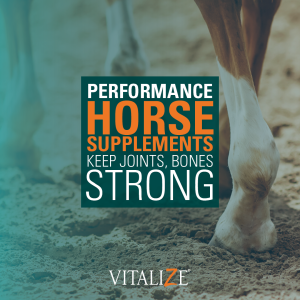
You can lead a horse to water, but can you make it drink? Preventing dehydration in the winter is key to preventing colic in horses. A dehydrated horse will likely have many health issues, especially in the winter.
At Vitalize®, we know all too well about dehydration in horses and how it can lead to colic. Our team of horse lovers would love to live where they don’t have to experience the winter weather. However, they know that winter weather disrupts the drinking patterns of their equine partners.
We hope you will find this quick read informative and helpful. We know that dehydration and horses don’t mix. At Vitalize, we make supplements for horses and dogs with proven solutions to keep your animal healthy and performing. We also create educational content to keep your animal feeling its best.
Winter Dehydration Causes Challenges
A dehydrated horse is susceptible to colic because its normal gut function becomes disrupted. Adequate hydration is essential to keep the contents in the horse’s digestive system moist and moving properly. When a horse becomes dehydrated, the feed material in the intestines can dry out, leading to impaction colic. Dehydration can also upset electrolyte balances and slow gut motility, increasing the likelihood of digestive blockages. In colder months, a horse is at higher risk of dehydration because they typically drink less water if it’s too cold, further increasing their vulnerability to colic.
Preventing a Dehydrated Horse in Winter
Preventing dehydration during the winter is essential for your horse’s health. Start by ensuring constant access to clean, fresh water. Horses tend to avoid drinking very cold water, so keeping it temperate (between 45–65°F or 7–18°C) can encourage consumption. Use heated water buckets or tank heaters to prevent water from freezing and maintain a palatable temperature.
Adding equine electrolytes or water to the horse’s feed can stimulate thirst and encourage them to drink more. Provide a salt block or loose salt in their stall or paddock for additional encouragement. Feeding soaked hay, beet pulp or bran mashes can also increase water intake through their diet.
Check water sources frequently to remove any ice if using unheated tanks or buckets. Monitoring hydration is also essential—perform a skin pinch test to check elasticity or look for dry, tacky gums as signs of dehydration.
Lastly, keep your horse moving. Regular turnout or light exercise promotes gut motility and encourages drinking. By combining these efforts, you can reduce the risk of dehydration and help prevent colic during winter.
Vitalize Can Help!
If you want to encourage your horse to drink, consider giving it Vitalize® Equine Gel. Vitalize Equine Gel encourages water intake. It is a prebiotic and nutrient-rich gel for horses designed to support the digestive and immune systems immediately. It also works fast to encourage appetite and hydration and contains AO-Biotics® Amaferm®, a prebiotic research-proven to enhance digestibility, and MOS.
Get Your Vitalize Now
Are you ready to purchase your Vitalize products to get your horses drinking? You can purchase them online or from one of our authorized online retailers.
Perhaps you like to shop locally. Discover where to buy Vitalize products near you.
Want to learn more about the Vitalize products that can give your horses #agoodgutfeeling? Sign up for our newsletter or visit our Vitalize Product Navigator.

